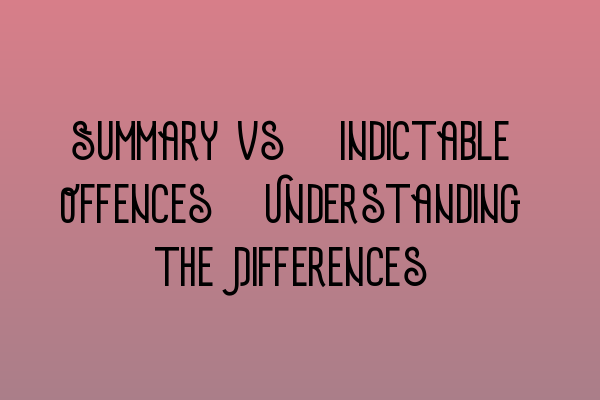Summary vs. Indictable Offences: Understanding the Differences
When it comes to the classification of criminal offences in the United Kingdom, there are two main categories: summary offences and indictable offences. It is essential to understand the differences between these two classifications to navigate the legal system properly.
Summary Offences
Summary offences, also referred to as minor offences, are less serious criminal charges that are typically tried in a Magistrates’ Court. These offences are less complex and carry relatively lower penalties. Some examples of summary offences include:
- Theft under £500
- Assault without causing grievous bodily harm
- Simple possession of controlled substances
Summary offences are usually dealt with summarily, meaning they are not subject to a trial by jury. The Magistrates’ Court has the authority to hear and determine these cases. However, in certain circumstances, summary offences can be escalated to the Crown Court for trial if the seriousness or complexity of the case demands it.
If you are preparing for an SQE examination, it is crucial to familiarize yourself with the types of offences and understand the applicable legal procedures. You can enhance your knowledge and test your understanding through SQE 1 Practice Exam Questions and SQE 1 Practice Mocks FLK1 FLK2.
Indictable Offences
Indictable offences, on the other hand, are more serious criminal charges that carry severe penalties and are typically tried in the Crown Court. These offences involve significant harm or loss and often require a more substantial legal process. Examples of indictable offences include:
- Murder
- Rape
- Drug trafficking
Indictable offences are generally heard before a judge and a jury in the Crown Court. The jury’s role is to assess the evidence presented and determine the guilt or innocence of the accused. The judge then decides on the appropriate sentencing if the accused is found guilty.
If you are aspiring to become a criminal law practitioner and are preparing for the SQE examinations, it is essential to enroll in SQE 2 Preparation Courses and SQE 1 Preparation Courses to gain a comprehensive understanding of the legal framework and procedures.
Understanding the Distinction
The distinction between summary and indictable offences is not always straightforward. Some offences can fall into both categories, known as either-way offences. These offences can be tried either in the Magistrates’ Court or the Crown Court, depending on the severity and circumstances of the case.
The decision whether to treat an either-way offence as a summary offence or an indictable offence is usually made during the first hearing at the Magistrates’ Court. The Magistrates’ Court will consider various factors, such as the nature of the offence, the defendant’s criminal history, and the potential sentence if found guilty. The decision will ultimately determine the court where the trial will take place.
It is essential to stay updated with the latest SRA SQE Exam Dates and ensure you have sufficient time to prepare for the relevant assessments. The SQE preparatory courses can guide you through the syllabus and help you develop the necessary skills and knowledge to succeed in the examinations. Being well-prepared will increase your chances of achieving a favorable outcome.
In conclusion, understanding the differences between summary and indictable offences is paramount in navigating the criminal justice system effectively. If you are preparing for the SQE examinations, take advantage of the resources available, such as SQE 1 Practice Exam Questions and SQE 1 Practice Mocks FLK1 FLK2, to enhance your knowledge and improve your chances of success.
